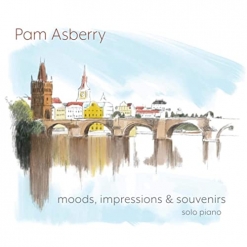In spite of (or maybe because of) her classical training from the age of seven, a Master’s Degree in Piano Performance and Pedagogy, and a long career as a piano teacher and adjudicator, Pam Asberry didn’t think she had what it takes to become a composer. Three years ago, she was out walking one morning and heard a melody in her head. She went home and wrote it down, literally opening the floodgates.
Moods, Impressions & Souvenirs is her fifth album in three years, and I hear she has several other albums ready to be released. With such a flurry of musical activity, I find it fascinating that Pam’s albums just keep getting better. All four of her previous releases were excellent, but I really think
Moods, Impressions & Souvenirs is her best work to date. The album was recorded and mastered at Piano Haven by Joe Bongiorno, and, as always, the piano sound is warm, rich and expressive.
The album pays homage to Zdenek Fibich, a Czech composer who lived from 1850-1900. Heavily influenced by the music of German Romantics such as Weber, Mendelssohn, Schumann and Wagner, Fibich composed a large body of work that includes piano solos, ensemble pieces, symphonies, and operas. After his death at the age of fifty, Fibich’s work was all but forgotten, but has had a revival in more recent years. He wrote a collection of almost four hundred piano pieces called
Moods, Impressions, and Souvenirs (aka
Moods, Impressions and Reminiscences) which was a musical diary of sorts. Pam’s album with the same title is a collection of her original music inspired by her own travels, memories and feelings and is more varied in mood and style than her previous albums.
Moods, Impressions & Souvenirs begins with “Praha Fantasy,” a reflection on the many wonders of Prague, the capital city of the Czech Republic. Dark, mysterious and very beautiful, it tells the story of a city with a long and varied history. “Swimming with Stingrays” is much lighter and expresses the graceful movements of these fascinating creatures as well as the water they inhabit. “The Astronomical Clock” is a favorite and is an aural depiction of the ancient clock in Prague. As the piece begins, there is a very steady rhythm that suggests the relentless movement of time. The second theme moves more quickly with a steady left hand and a more fanciful right, punctuated with some powerful crossovers to the deep bass of the piano. “Adagio” is another favorite, and is much slower and more emotional. Pam calls it “an atmospheric melody tinged with melancholy and bittersweet sorrow” - a perfect description that I can’t improve on other than to say that I hear some of Chopin’s influence. “Cry from Lamanai” is my favorite piece on the album. Very dark and even more haunting, I love the way the accents in the deep bass of the piano counter the lively rhythm. I can’t wait for the sheet music for this one! I like “Floating” almost as much and think these two pieces work well as a set with their similar rhythms and completely different moods. Next, we go for “A Walk Across the Charles Bridge,” where Pam captured the relaxed walking pace of a sight-seer enraptured by her surroundings. “White Poppy” is “a lamentation named after the white flower that represents remembrance for victims of war and a commitment to peace” (quoted from the liner notes). When she recorded “White Poppy,” Pam had no way of knowing that the world would be dealing with the tragedy of COVID-19 when it was released. It’s an amazing closing to a stellar album!
Moods, Impressions & Souvenirs is available from
PamAsberry.com, Amazon, iTunes/Apple Music, Spotify and many of the streaming sites. Don’t miss this one!

